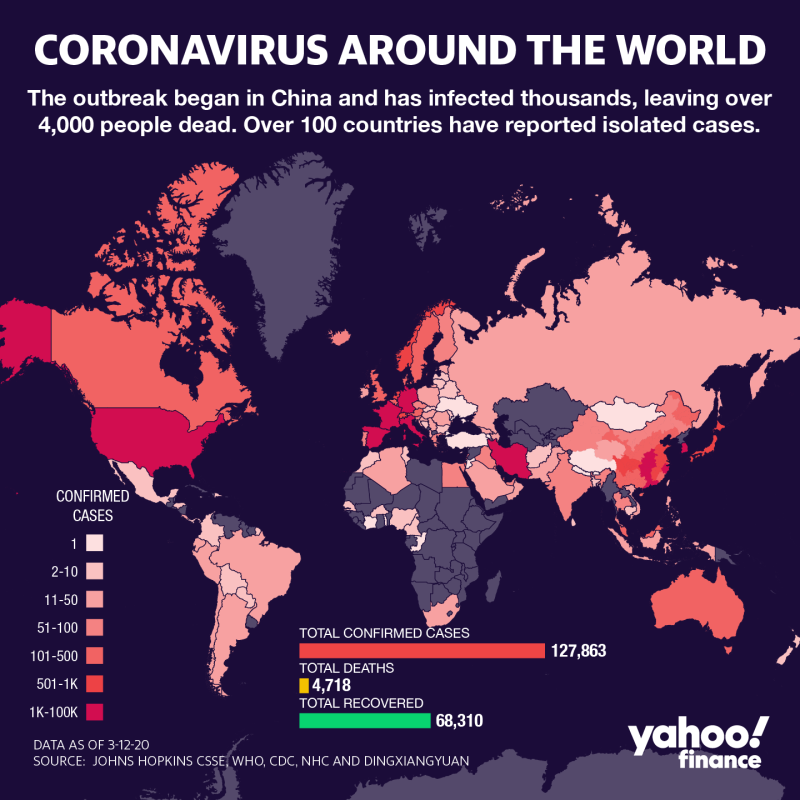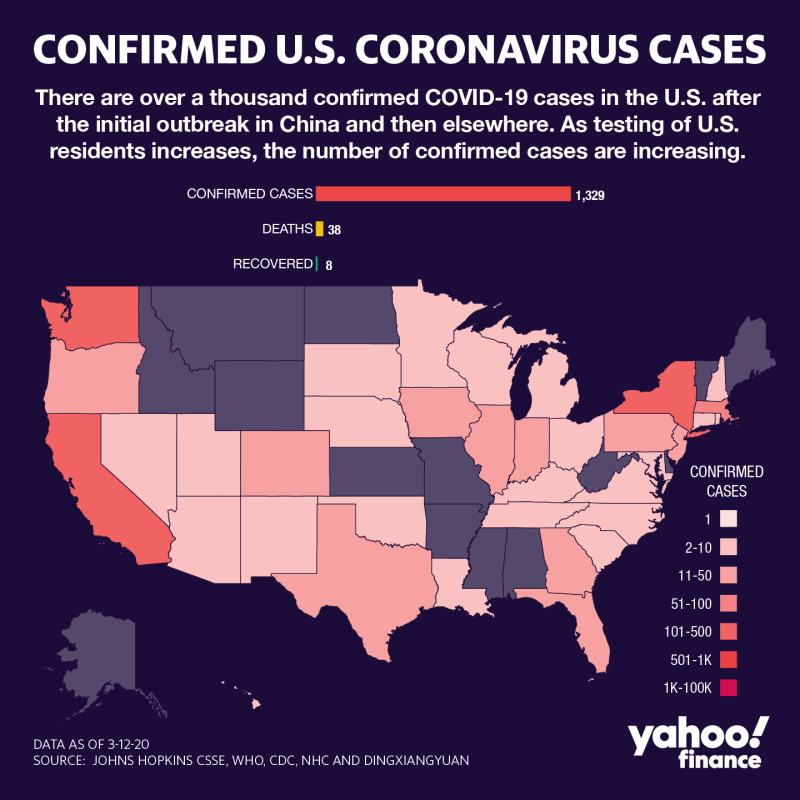Javier E. DavidandAnjalee Khemlani•March 12, 2020
The world’s battle to manage the coronavirus’ spread entered a delicate phase on Thursday, as Italy’s death toll passed a grim milestone and U.S. officials acknowledged that the world’s largest economy was “failing” in its effort to identify and prevent new infections.
The World Health Organization’s decision on Wednesday to formally declare a pandemic has underscored the growing severity of the crisis, with global infections nearing 130,000 across more than 100 countries — with cases outside of China having multiplied rapidly.
“Let me be clear: describing this as a pandemic does not mean that countries should give up,” Tedros Adhanom Ghebreyesus, the World Health Organization’s director general, said on Thursday.
Despite the “speed and scale” of new COVID-19 transmissions, Ghebreyesus stated that the coronavirus was “controllable” if governments got themselves ready. “The idea that countries should shift from containment to mitigation is wrong and dangerous. On the contrary, we have to double down.”
The financial and economic toll also grew, with investors hammering major benchmarks deeper into correction territory. Fears also grew inside the world’s largest economy, after President Donald Trump announced narrow travel restrictions on Europe that failed to ease an angst-ridden market.
Multiple professional and college sports leagues moved to suspend their schedules, while numerous businesses encouraged employees to work from home in order to prevent more community spreading of the disease. March Madness — college basketball’s marquee event — was canceled after days of speculation, as schools and other public institutions across the country shut their doors.
In New York — which is now the second largest coronavirus hot zone in the U.S. behind Washington State — Governor Andrew Cuomo announced a ban on gatherings of 500 people or more amid a state of emergency. New York City also declared an emergency.
While containment efforts in China and South Korea have been encouraging, Italy and the U.S. are now locked in a race against time as new cases skyrocket in both countries. Italy — which on Thursday saw its death toll hit 1,000 in the wake of implementing a rigid quarantine protocol — now has the distinction of having Europe’s worst cluster of infections, and the second-highest outside of China.

The global toll is closing in on 130,000, with deaths near 5,000.More
In America, new cases are surfacing rapidly amid concerns that testing and treatment for the disease aren’t up to the growing challenge. Anthony Fauci, the top U.S. official on infectious diseases, said as much in a sobering assessment of the state of play to Congress.
"The system is not really geared to what we need right now... That is a failing. Let's admit it," Fauci said.
While faulty testing kits from the Centers for Disease Control slowed down the U.S. response, Quest Diagnostics (DGX) and Labcorp (LH) have begun offering tests for doctor’s offices. The country’s top health officials anticipate a clearer picture of where the virus has spread as more tests are completed.
"The idea of anybody getting it easily the way people in other countries are doing it, we're not set up for that,” he added. “Do I think we should be? Yes. But we're not."
‘We have to assume the worst’

The COVID-19 pandemic is growing, with over 1,000 infected domestically and more than 120,000 worldwide.More
U.S. stocks tumbled by more than 7%, with Wall Street locked in a wave of panicky selling as the virus’ human and economic toll widened.
The New York Federal Reserve stepped in midday Thursday and announced a major asset purchase program, offering $500 billion in a three-month repo operation that will repeat tomorrow. The New York Fed also said its securities purchases would be along a range of maturities, to match the composition of the Treasury market.
However, few analysts believe the problem will be resolved with more Fed easing — especially as the jitters lay waste to specific sectors like travel, leisure and entertainment. And social distancing and self-quarantine efforts being encouraged by governments to prevent more spreading are a drag on companies that rely on consumer traffic, like Starbucks (SBUX) and Uber (UBER).
Carnival Cruises (CCL) announced it would halt its Princess Cruises globally for 60 days. The cruise line has seen multiple ships affected by the outbreak, including widespread infection from the Diamond Princess quarantined in Japan for two weeks with 3,700 on board.
As global diffusion of the virus goes unchecked, hopes have been pinned on the development of treatment and vaccine regimens that can ameliorate the crisis — yet drugs currently in development are unlikely to be publicly available for months, if not years.
Gregory Glenn, president of clinical-stage pharmaceutical company Novavax (NVAX), told Yahoo Finance on Thursday that the normal time frame for developing vaccines can be as high as a decade. However, Glenn added there were exceptions to that rule.
“We know from Ebola that [timeline] was shortened quite a bit,” Glenn told “On the Move” — especially as the federal government put pressure on pharma firms to speed up operations in the coronavirus fight.
“It’s my expectation that we can shorten some time, so we’re a little bit in unknown territory” he said — adding that testing could begin this spring and a vaccine could be ready within 18 months.
Yet Glenn warned that countries “have to assume the worst” about the virus’ ability to be controlled.
“The more worrisome thing for me is not today, but what we call a ‘second wave’ where the virus has now gotten into the community...and comes back,” he told Yahoo Finance. “We want to try to be ready and able to address that, if at all possible.”
No comments:
Post a Comment